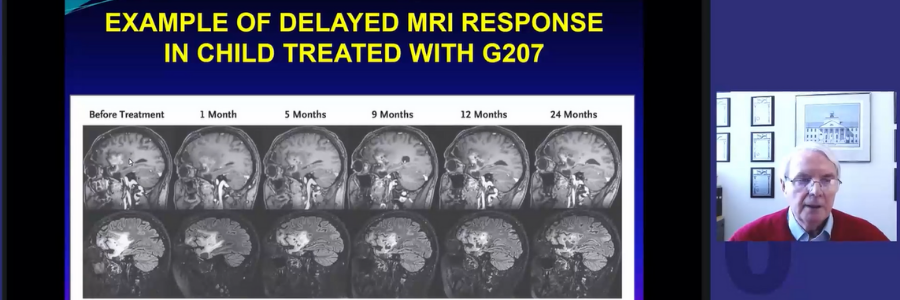Celebrating Milestones at the Presidential Symposium
Kenji Rowel Lim - May 25, 2021
Robert Martuza, M.D., who is known for his pioneering work on oncolytic viruses, discussed uniting genetic engineering, virology, immunology, and cancer research, during his talk at the 24th Annual Meeting.

More than a year into the pandemic, ASGCT and its members are still making huge waves in the scientific community. And what better way to see this in action than during the recently concluded 24th Annual Meeting. This year, more than 6500 people attended the four-day virtual meeting, which showcased amazing work from nearly 900 abstracts on gene and cell therapy—a record-breaking event in more ways than one.
“I do think we’re at a historic juncture at the moment for the field of medicine,” remarked ASGCT President Stephen Russell, M.D., Ph.D., as he opened this year’s Presidential Symposium. Russell went on to enumerate a number of triumphs achieved by the gene and cell therapy field in the past year: numerous drug approvals, continued progression of several therapies in clinical trials, and (of course!) the successful development of COVID-19 vaccines based on mRNA and nanoparticle technology.
Russell further commented that “the underpinning technologies [for developing gene and cell therapies] have been advancing very fast.” Indeed one such technology, despite being only discovered in 2012, has introduced such a simple and versatile approach to genome editing that it has rapidly joined others at the forefront of gene therapy. This technology, called CRISPR, was so revolutionary that Drs. Jennifer Doudna and Emmanuelle Charpentier were awarded the 2020 Nobel Prize in Chemistry for its discovery less than a decade later. Russell, who joined Doudna in a fireside chat during the Annual Meeting, lauded her as “a truly inspirational leader” and described CRISPR as “a great milestone for the field.”
Martuza Discusses Development of Oncolytic Viruses
Continuing this celebration of science during the Presidential Symposium was a talk from invited speaker Robert Martuza, M.D., William and Elizabeth Sweet Professor of Neuroscience at Harvard Medical School and Chief Emeritus of Neurosurgery at Massachusetts General Hospital. Besides his significant contributions to understanding the genetics of neurofibromatoses, Martuza is also known for his pioneering work on oncolytic viruses, i.e., viruses that selectively eliminate tumor cells but not healthy cells.
Martuza’s talk focused on the development of these viruses, which were first described in a story in the journal Science in 1991. He explained how he and his team initially treated human gliomas implanted in mice using a version of the herpes simplex virus that could not produce active thymidine kinase. As this enzyme is required for viral replication, the mutant virus had to rely on the thymidine kinase produced by host cells for survival, which was highly abundant in tumor cells but not in healthy brain cells. The virus could thus only replicate in tumors, selectively killing them. Martuza described generations of work that built on this elegant concept, explaining how genetic engineering could be done to further improve the efficacy of oncolytic viruses.
“As of a couple of weeks ago [May 6, 2021], there were 119 studies ongoing in 142 sites using oncolytic viruses for cancer,” Martuza said at the end of his talk, showing how far the technology has come in the span of 30 years. It was very inspiring to listen to Martuza and his story of innovation and against-all-odds perseverance.
Presentation of the Top Abstracts
After Martuza’s talk, four excellent speakers presented research from the highest-rated abstracts from this year’s Annual Meeting:
- Jonathan Yen, Ph.D. (St. Jude Children’s Research Hospital), described how CRISPR could be used to convert a mutation associated with severe sickle cell disease into a non-pathogenic form in hematopoietic stem and progenitor cells, with positive effects in patient cells and mouse models.
- Tony Ho, M.D. (CRISPR Therapeutics, Inc.), presented promising data from two phase 1/2 trials testing CTX001—hematopoietic stem and progenitor cells edited by CRISPR to promote fetal hemoglobin production—for the treatment of transfusion-dependent β-thalassemia and sickle cell disease.
- Eleni Panagioti, Ph.D. (Mayo Clinic; Harvard Medical School), talked about how we could improve the efficacy of oncolytic measles viruses by equipping them with a powerful immunostimulatory protein from Helicobacter pylori in addition to checkpoint inhibition.
- Alessio Nahmad, M.Sc. (Tel Aviv University), showed how B cells could be directly engineered in mice using CRISPR to express broadly neutralizing antibodies against HIV.
It truly has been a great year for ASGCT despite challenging times, and this was reflected very well in the Presidential Symposium. All Annual Meeting content will be available to registered attendees through August 13, so if you missed this year’s Presidential Symposium (or other awesome sessions) you can still watch them at ASGCT.org/2021. And with that, see you all again next year! Until then, take care and stay strong.
Kenji Rowel Lim is a Ph.D. candidate in medical genetics at the University of Alberta, Canada, and a member of the ASGCT Communications Committee.
Related Articles